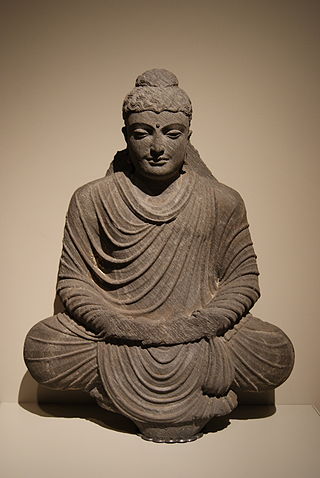
The Triratna Buddhist Community, formerly the Friends of the Western Buddhist Order (FWBO), is an international fellowship of Buddhists. It was founded in the UK in 1967 by Sangharakshita and describes itself as "an international network dedicated to communicating Buddhist truths in ways appropriate to the modern world". In keeping with Buddhist traditions, it also pays attention to contemporary ideas, particularly drawn from Western philosophy, psychotherapy, and art.

Ānāpānasati, meaning "mindfulness of breathing", is the act of paying attention to the breath. It is the quintessential form of Buddhist meditation, attributed to Gautama Buddha, and described in several suttas, most notably the Ānāpānasati Sutta.
Mindfulness is the cognitive skill, usually developed through meditation, of sustaining meta-attentive awareness towards the contents of one's own mind in the present moment. Mindfulness derives from sati, a significant element of Hindu and Buddhist traditions, and is based on Chan, Guān, and Tibetan meditation techniques. Though definitions and techniques of mindfulness are wide-ranging, Buddhist traditions describe what constitutes mindfulness, such as how perceptions of the past, present and future arise and cease as momentary sense-impressions and mental phenomena. Individuals who have contributed to the popularity of mindfulness in the modern Western context include Thích Nhất Hạnh, Joseph Goldstein, Herbert Benson, Jon Kabat-Zinn, and Richard J. Davidson.

Buddhist meditation is the practice of meditation in Buddhism. The closest words for meditation in the classical languages of Buddhism are bhāvanā and jhāna/dhyāna.
The Vipassanā movement refers to a branch of modern Burmese Theravāda Buddhism that promotes "bare insight" (sukha-Vipassana) meditation practice to develop insight into the three marks of existence and attain stream entry. It gained widespread popularity since the 1950s, including through its western derivatives which have been popularised since the 1970s, giving rise to the more dhyana-oriented mindfulness movement.
Sati, literally "memory" or "retention", commonly translated as mindfulness, "to remember to observe", is an essential part of Buddhist practice. It has the related meanings of calling to mind the wholesome dhammas such as the four establishments of mindfulness, the five faculties, the five powers, the seven awakening-factors, the Noble Eightfold Path, and the attainment of insight, and the actual practice of maintaining a lucid awareness of the dhammas of bodily and mental phenomena, in order to counter the arising of unwholesome states, and to develop wholesome states. It is the first factor of the Seven Factors of Enlightenment. "Correct" or "right" mindfulness is the seventh element of the Noble Eightfold Path.
Gil Fronsdal is a Norwegian-born, American Buddhist teacher, writer and scholar based in Redwood City, California. He has been practicing Buddhism of the Sōtō Zen and Vipassanā sects since 1975, and is currently teaching the practice of Buddhism in the San Francisco Bay Area. Having been taught by the Vipassanā practitioner Jack Kornfield, Fronsdal is part of the Vipassanā teachers' collective at Spirit Rock Meditation Center. He was ordained as a Sōtō Zen priest at the San Francisco Zen Center in 1982, and was a Theravāda monk in Burma in 1985. In 1995, he received Dharma transmission from Mel Weitsman, the abbot of the Berkeley Zen Center.

Buddhism includes an analysis of human psychology, emotion, cognition, behavior and motivation along with therapeutic practices. Buddhist psychology is embedded within the greater Buddhist ethical and philosophical system, and its psychological terminology is colored by ethical overtones. Buddhist psychology has two therapeutic goals: the healthy and virtuous life of a householder and the ultimate goal of nirvana, the total cessation of dissatisfaction and suffering (dukkha).

Valerie Mason-John is an English academic and the co-founder of Eight Step Recovery – Using The Buddha's Teaching to Overcome Addiction, an alternative to the 12-step programmes for addiction.
Samatha, "calm," "serenity," "tranquility of awareness," and vipassanā, literally "special, super, seeing ", are two qualities of the mind developed in tandem in Buddhist practice.

Fo Guang Shan Temple of Toronto was built to serve as a cultural, educational, community and spiritual centre for Chinese Buddhism and those interested in Buddhist teachings and practice. Founded by Venerable Master Hsing Yun in 1991 and completed in 1997, Fo Guang Shan Temple of Toronto is one of the over 400 Fo Guang Shan Temples worldwide. It was founded with the intention to propagate Humanistic Buddhism to the local community in the Greater Toronto Area, which emphasizes bringing Buddhist teaching into our daily lives and maintaining harmony with the environment, society, each other and within ourselves.

The Plum Village Tradition is a school of Buddhism named after the Plum Village Monastery in France, the first monastic practice center founded by Thích Nhất Hạnh, Chân Không, and other members of the Order of Interbeing. It is an approach to Engaged Buddhism mainly from a Mahayana perspective, that draws elements from Thiền, Zen, and Pure Land traditions. Its governing body is the Plum Village Community of Engaged Buddhism.
Anne Cushman is an American teacher of yoga as exercise and meditation, a writer on Mindful Yoga, and a novelist. Her novel Enlightenment for Idiots was named by Booklist as one of the top ten novels of 2008. Cushman has also been an editor for Yoga Journal and Tricycle: The Buddhist Review. She directs mentoring programs and multi-year meditation training for yoga teachers at the Spirit Rock Meditation Center, emphasizing the fusion of yoga and Buddhist meditation and highlighting their shared history and philosophy.

Mindful Yoga or Mindfulness Yoga combines Buddhist-style mindfulness practice with yoga as exercise to provide a means of exercise that is also meditative and useful for reducing stress. Buddhism and Hinduism have since ancient times shared many aspects of philosophy and practice including mindfulness, understanding the suffering caused by an erroneous view of reality, and using concentrated and meditative states to address such suffering.
Frank Jude Boccio is a teacher and the originator of Mindfulness Yoga as he distinguishes his approach, based upon the Buddha's teaching of satipatthana, from Mindful Yoga, which simply emphasizes doing postures mindfully. He explains the difference in his blog where he writes "In mindful yoga, one is practicing asana mindfully; in Mindfulness Yoga one is practicing mindfulness in the posture." He is known both for his teaching in centres across America, and for his 2004 book Mindfulness Yoga: The Awakened Union of Breath, Body and Mind, which describes a practice that combines yoga as exercise and Buddhist meditational practice.

BreathworksCIC is an international mindfulness organization founded in the United Kingdom, which offers mindfulness-based approaches to living well with pain, stress, and illness. It is known particularly for developing the approach of mindfulness-based pain management (MBPM), which shares many elements with mindfulness-based stress reduction (MBSR) but is adapted specifically for those living with chronic pain and illness, and incorporates a distinctive emphasis on the practice of 'loving-kindness'. Breathworks is a registered Community Interest Company (CIC) in the United Kingdom, and has nearly 500 accredited teachers working in 35 countries.

Prudence Margaret Burch, known professionally as Vidyamala Burch, is a mindfulness teacher, writer, and co-founder of Breathworks, an international mindfulness organization known particularly for developing mindfulness-based pain management (MBPM). The British Pain Society has recognized her "outstanding contribution to the alleviation of pain", and in 2019, 2020, 2021 and 2022 she was named on the Shaw Trust Power 100 list of the most influential disabled people in the UK. Burch's book Mindfulness for Health won the British Medical Association's 2014 Medical Books Award in the Popular Medicine category.
Mindfulness-based pain management (MBPM) is a mindfulness-based intervention (MBI) providing specific applications for people living with chronic pain and illness. Adapting the core concepts and practices of mindfulness-based stress reduction (MBSR) and mindfulness-based cognitive therapy (MBCT), MBPM includes a distinctive emphasis on the practice of 'loving-kindness', and has been seen as sensitive to concerns about removing mindfulness teaching from its original ethical framework. It was developed by Vidyamala Burch and is delivered through the programs of Breathworks. It has been subject to a range of clinical studies demonstrating its effectiveness.
Ian Johnson, known by his Dharma name Maitreyabandhu, is a British Buddhist writer and poet who lives and works at the London Buddhist Centre. He has written a number of books on Buddhism. His poetry has been published by Bloodaxe and awarded the Keats-Shelley Prize and the Geoffrey Dearmer Award.











